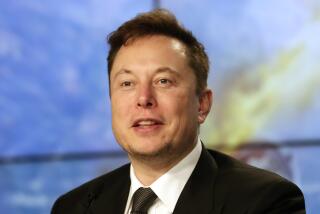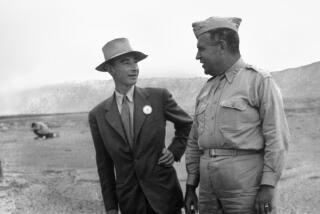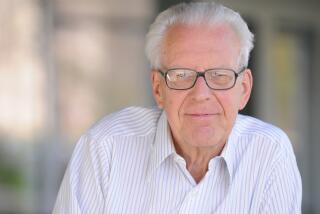This Was a Dilemma Made for an Einstein
- Share via
To me, the most eloquent message Albert Einstein delivered during his long and historic life was wordless. It was addressed to a Pasadena boy in short pants outside a Caltech jitney that had just returned from the Mt. Wilson Observatory. The vehicle’s select passengers had been inspecting the world’s then-largest telescope with its 100-inch lens.
The year was 1928 and the passengers were Einstein; Robert A. Millikan, Nobelist and head of Caltech; Lee DeForest, inventor of the vacuum radio tube; a rumpled Dutch astronomer, a starchy banker and his son. I was that 6-year-old boy.
I had heard of the visiting Einstein’s scientific genius, but what impressed me when we met was his appearance. He wore a ratty sweater and baggy knickers. His mustache was scraggly and his long, wire-haired mane stood electrically up in all directions.
On the way up to the observatory, the grown-ups chatted learnedly as the jitney rattled along. I tuned them out and watched the smudge pots pouring out soot in the endless orange groves as we ascended through foothills.
Atop Mt. Wilson it was chilly. Einstein buttoned his thick cardigan all the way up and stomped his feet. Before we saw the telescope, we were to view some new construction around the observatory, and I remember the contractor told Millikan that more kerosene was needed to warm the workers’ bunkhouse and mess hall.
It was cool and antiseptic in the main telescope building with its dome, and my legs were getting cold while I waited my turn to look through the lens from a box my father had fetched for me to stand on.
What disappointment. Not knowing what to look for, I saw nothing in the skies. The adults, however, were seemingly jubilant at whatever they’d observed, and the mood was festive en route to the mess hall on the construction site for lunch.
As we walked, Einstein dropped back a few paces to ask me, “And what did you see, young man?”
“Nothing at all,” I replied.
My tone of dismay seemed to amuse him. “Ja,” he said. “Too much daylight for all of us.” He chuckled and I sensed that he had taken a fancy to me, perhaps because of my frankness.
At the table, where we sat on planks across rude 2-by-4s, Einstein was at the head, flanked by Millikan and astronomer Adrian van Maanen. My father and I were at the other end with the construction foreman and bus driver when drink orders were taken for coffee, tea or Nehi, a chocolaty soft drink of the time.
Einstein called down to me, “And what would the young man like?”
His tone was so friendly I thought perhaps he was trying to make up for my not having seen a comet, planet or some other heavenly phenomenon when I’d looked through the lens. I was emboldened.
“Do you have a chocolate milkshake?” I responded.
Einstein looked quizzically at the mess cook in a calico apron and 10-gallon hat. The cook shrugged and went into a crude pantry. I could hear him clinking glassware and slamming an icebox door. I caught a glimpse of a half-empty milk bottle being shaken in the air, the old-fashioned kind with a bulbous neck for the collection of cream. I hoped the cook had regular ice cream in the icebox and maybe chocolate syrup like mother’s.
Talking ceased when the cook reappeared and set a tall glass in front of me. Sure enough, its contents were chocolate in color and thick enough to indicate ice cream.
“Thank you,” I said to the cook and “Thank you, sir” to Einstein, who beamed like a generous uncle before resuming discourse.
It was a shock to taste that milkshake. The milk had long since curdled. There were tiny chewy bits of curd in the whey. The concoction was tepid, as if the ice cream had really been custard. The flavoring, which tasted like a mix of Nehi and bouillon, could not neutralize the overwhelming sourness. I wanted to gag.
After another tentative sip, I put the glass aside.
My father eventually noticed it was going unconsumed.
“Drink it,” he whispered.
“I can’t. It’s too sour.”
Einstein had also noticed the full glass. “What did the young man say?”
“It’s excellent,” my father answered for me. “And very nice of you, doctor.”
Einstein smiled and continued the conversation with the others. Under this cover, my father hissed, “Drink it!”
“I c-a-a-n’t!” It was almost a wail.
“Carter!” my father said loudly, beginning to flush.
Again Einstein suspended his discussion with Millikan, sensing that something was amiss.
I felt his and everyone else’s eyes upon me and the spoiled treat.
“And how is your drink, young man?” he asked me point blank.
“It’s too sour.”
“Not really,” my father interjected again with a grin at Einstein. To me he was grim and ordered, “So drink up, son.”
“Oh, let the boy be,” Einstein commanded in his turn. He had suddenly turned stern, but with a reassuring smile to me.
And my father did. I didn’t have to finish that milkshake, although I had to ride by myself in the jitney on the way back to Caltech. My father had been embarrassed and sat with his old friend Van Maanen.
After we disembarked back at the campus, the scientists shook hands all around and walked away in a still-chattering group.
My father and I went in a different direction--but not before Einstein had bent down slightly to lay his arm across my shoulders. He hugged me. Then he straightened up to give me several pats on the head. He said nothing.
The physical contact was far weightier communication. His tact in making no reference to the milkshake paled in comparison to the message those pats conveyed.
Perhaps he was remembering his own boyhood. In maturity and celebrity amid all his cosmic preoccupations, he still understood fathers and sons and the importance of kindness.






